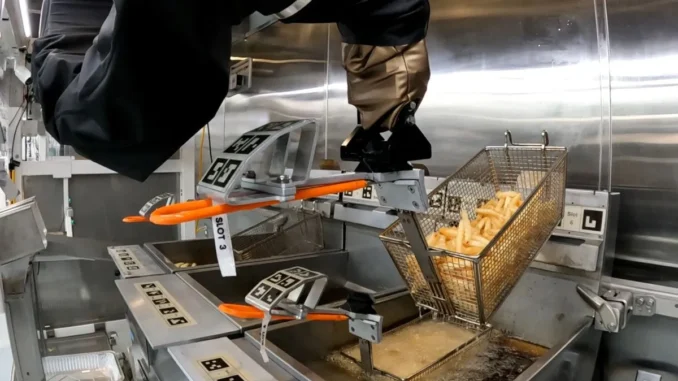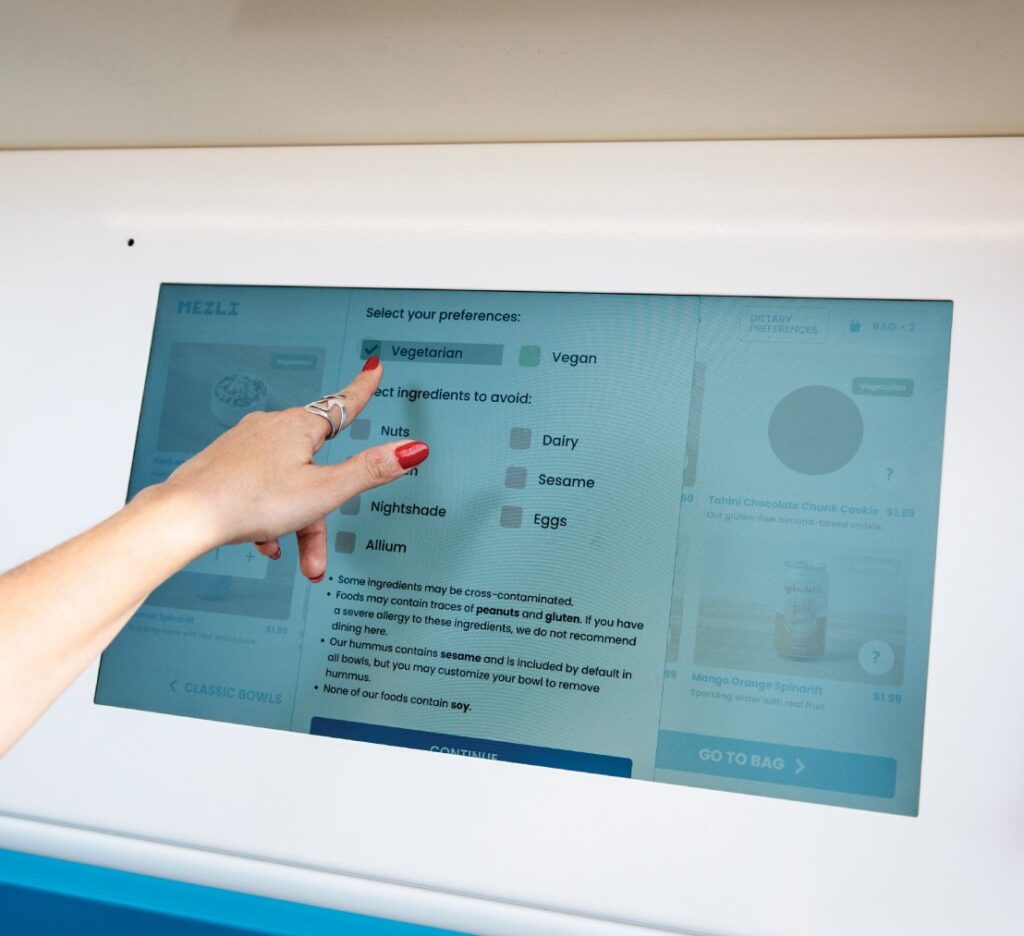
By Lea Mira, RTN staff writer - 12.6.2023
Cali Group, which owns global QSR restaurant chain CaliBurger, in collaboration with technology companies Miso Robotics and PopID (a majority owned subsidiary of Cali Group), is set to open CaliExpress by Flippy, a groundbreaking venture that is being billed as the world’s first fully autonomous restaurant. Located in Pasadena, California, the new establishment will leverage advanced technology to transform both the consumer dining experience and the workplace for restaurant employees.
At CaliExpress by Flippy, customers will be greeted by a seamless integration of artificial intelligence and robotics. The restaurant’s grill and fry stations will be fully automated, with Flippy, the AI-powered robotic fry station, and a grill robot that grinds beef in real-time. This technology is designed to ensure that each burger patty is freshly made and fries are cooked to precision, offering a simple yet premium menu of burgers, cheeseburgers, and french fries at competitive prices.
The use of PopID’s biometric verification platform will further enhance the customer experience. Upon arrival, guests can check in using their PopID accounts at self-ordering kiosks, receiving personalized order recommendations and processing payments quickly and effortlessly. This system not only streamlines the ordering process but also adds a layer of personalization to the dining experience.
For employees, the autonomous kitchen environment promises a safer and more efficient workspace. The implementation of Flippy at the fry station significantly reduces the risk of common kitchen accidents such as slippage and burns. Additionally, the technology contributes to waste reduction in both food and oil. With a smaller crew required to operate the kitchen, CaliExpress by Flippy can offer a less stressful work environment and above-average wages for its staff.

In addition to serving food, the CaliExpress by Flippy location will reportedly double as an educational space. Miso Robotics plans to present the restaurant as a pseudo-museum, showcasing retired Flippy robot arms, 3D-printed artifacts from past development, photographic displays, and more. The aim is to inspire future kitchen AI and automation entrepreneurs, with local schools and educational groups invited to tour the facility.
Rich Hull, CEO of Miso Robotics, emphasizes the potential for AI-powered, robotic order-taking, and cooking. “AI-powered, robotic order-taking and cooking enables the major chains that feed America to substantially improve quality, consistency and speed,” he said in a press statement annoucing the restaurant opening.
CaliExpress by Flippy is scheduled to open in December 2023, initially by reservation only, with a grand opening to follow. Interested parties can visit MisoRobotics.com/CaliExpress for reservations, special offers, and tour information.
Cali Group, as a holding company, focuses on investing in restaurants and technologies that advance the restaurant and retail sectors. Miso Robotics specializes in intelligent automation solutions for commercial foodservice, addressing challenges in kitchen operations with its AI-driven platform. PopID offers a comprehensive platform for digital interactions and payments using biometric verification, streamlining consumer experiences with secure and personalized options for identification.
The title for “world’s first fully autonomous restaurant” may actually go to another California-based startup concept. Called Mezli, the restaurant opened for business in September and is currently operating in San Francisco’s SPARK Social food court.
According to the company, it is the first-ever restaurant to serve a full hot menu to customers without requiring any human intervention. The automated approach allows Mezli to offer its menu of Mediterranean grain bowls, sides, and drinks at a significantly lower price point than similar fast-casual restaurants – its grain bowls start at $6.99 – providing a healthy, convenient and affordable dining option for neighborhood residents and workers.
 Mezli was founded by a team of Stanford engineers: Alex Kolchinski, Alex Gruebele, and Max Perham. As graduate students at Stanford, they found that they had no nearby food options that were convenient, affordable, and healthy. Putting their technical backgrounds to use, they teamed up with Michelin-star chef Eric Minnich to solve the problem with a combination of robotic and culinary innovation.
Mezli was founded by a team of Stanford engineers: Alex Kolchinski, Alex Gruebele, and Max Perham. As graduate students at Stanford, they found that they had no nearby food options that were convenient, affordable, and healthy. Putting their technical backgrounds to use, they teamed up with Michelin-star chef Eric Minnich to solve the problem with a combination of robotic and culinary innovation.
The team started full-time work on Mezli in January of 2021 while participating in the Y Combinator startup accelerator and working out of the Kitchentown food innovation center. During 2021, the team opened a pop-up restaurant, built a prototype robot, and brought on a number of employees, investors, including roboticist Pieter Abbeel.
In June of this year, the company successfully raised a $3.5 million investment seed round. Participants included a number of individual and institutional investors, including Metaplanet, AIX Ventures, Share Capital and Reinforced Ventures.
Previous automated culinary concepts have either achieved partial automation of fresh hot menus, but required human involvement in the process, or achieved full automation of simpler menus, like rehydrated noodle bowls and made-to-order cold salads. This restaurant is the first to autonomously serve customers a fully customizable, made-to-order hot menu, with no human intervention required at all.
More restaurant chains are incorporating robotics. Just last month, Sweetgreen, the fast-casual salad chain with more than 175 locations, announced that it is expanding its use of the Infinite Kitchen, an assembly line robot that can produce up to 500 bowls, plates, and sides per hour. This is a 50% increase in production compared to a typical restaurant’s front and digital make line. The advent of CaliExpress by Flippy and Mezli represents an even bigger leap forward in the restaurant industry, showcasing the potential of automation and artificial intelligence to redefine dining and kitchen operations. As these pioneering ventures open their doors, they not only challenge traditional restaurant models but also set new benchmarks for what is possible in the realm of automated dining solutions.

